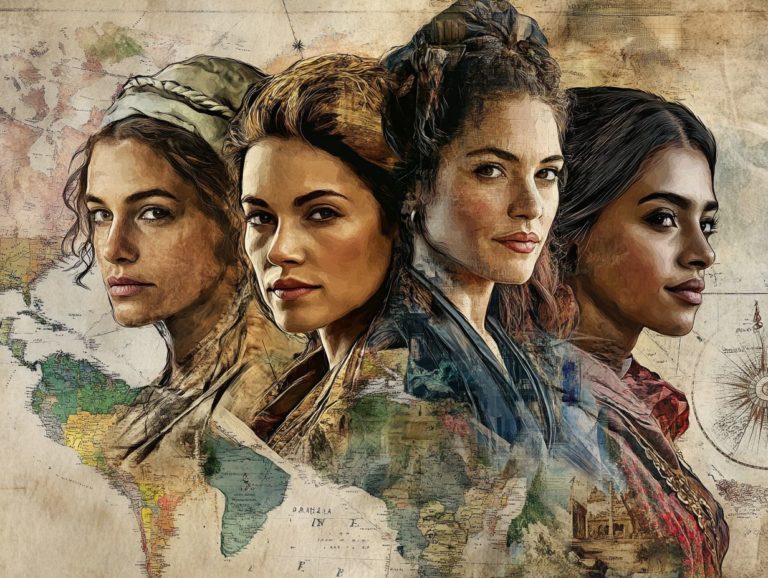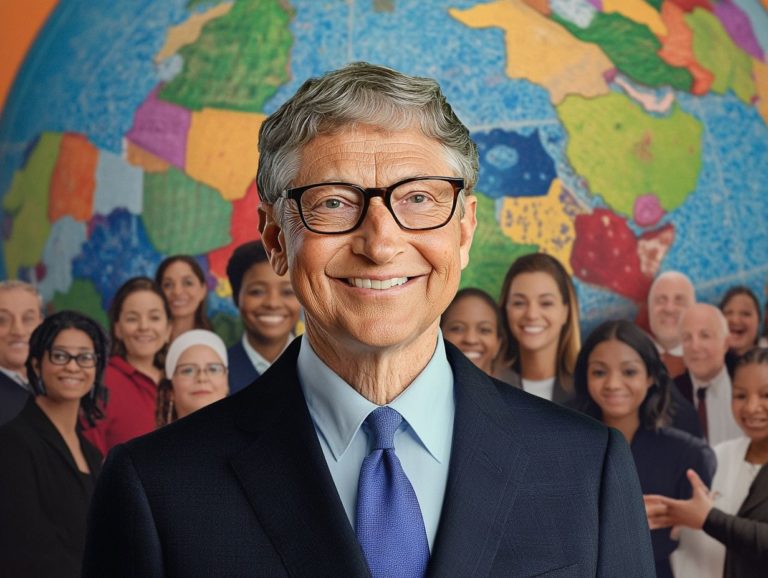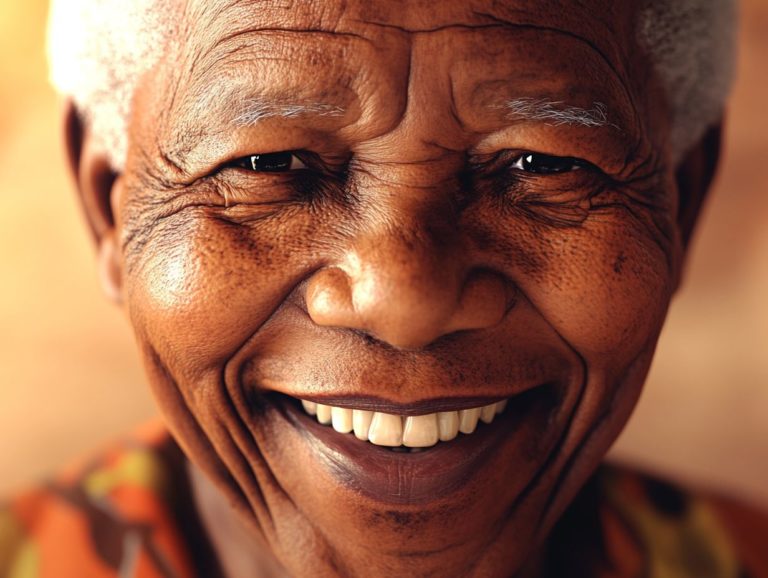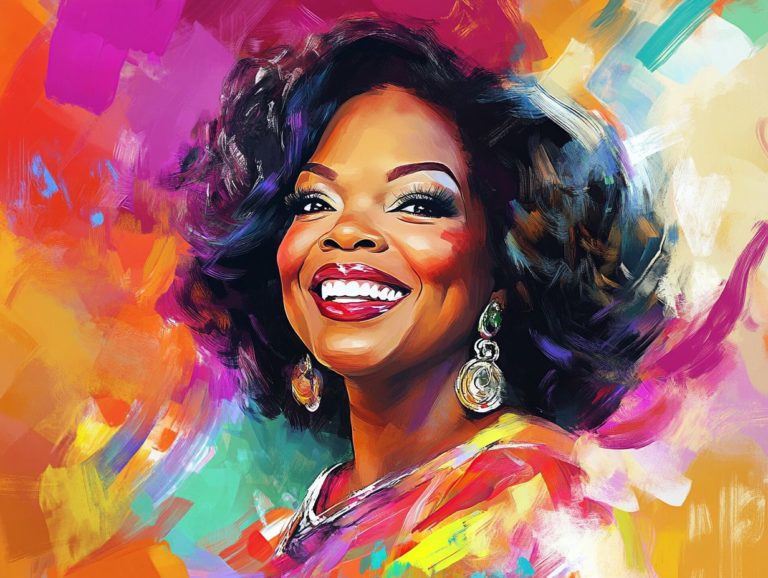5 Inspirational Quotes from Nelson Mandela
Nelson Mandela’s journey from political prisoner to global icon exemplifies resilience, hope, and the transformative power of education and courage.
His words, frequently profound and stirring, resonate deeply, inspiring you to pursue justice and embrace change in your own life.
In this exploration, you will encounter five of his most inspirational quotes, delving into the lessons they convey and the experiences that shaped these powerful messages.
Join us in reflecting on Mandela’s legacy and discover how you can apply his timeless wisdom to enhance your own journey.
Contents
- Key Takeaways:
- 1. “Education is the most powerful weapon which you can use to change the world.”
- 2. “It always seems impossible until it’s done.”
- 3. “The greatest glory in living lies not in never falling, but in rising every time we fall.”
- 4. “I learned that courage was not the absence of fear, but the triumph over it.”
- 5. “A good head and a good heart are always a formidable combination.”
- Why Is Nelson Mandela Considered an Inspirational Figure?
- How Did Nelson Mandela’s Life and Struggles Impact His Views and Beliefs?
- What Are Some of Nelson Mandela’s Most Memorable Moments and Achievements?
- What Are Some Other Famous Quotes from Nelson Mandela?
- How Can We Apply Nelson Mandela’s Words of Wisdom in Our Daily Lives?
- What Can We Learn from Nelson Mandela’s Legacy?
- Frequently Asked Questions
Key Takeaways:
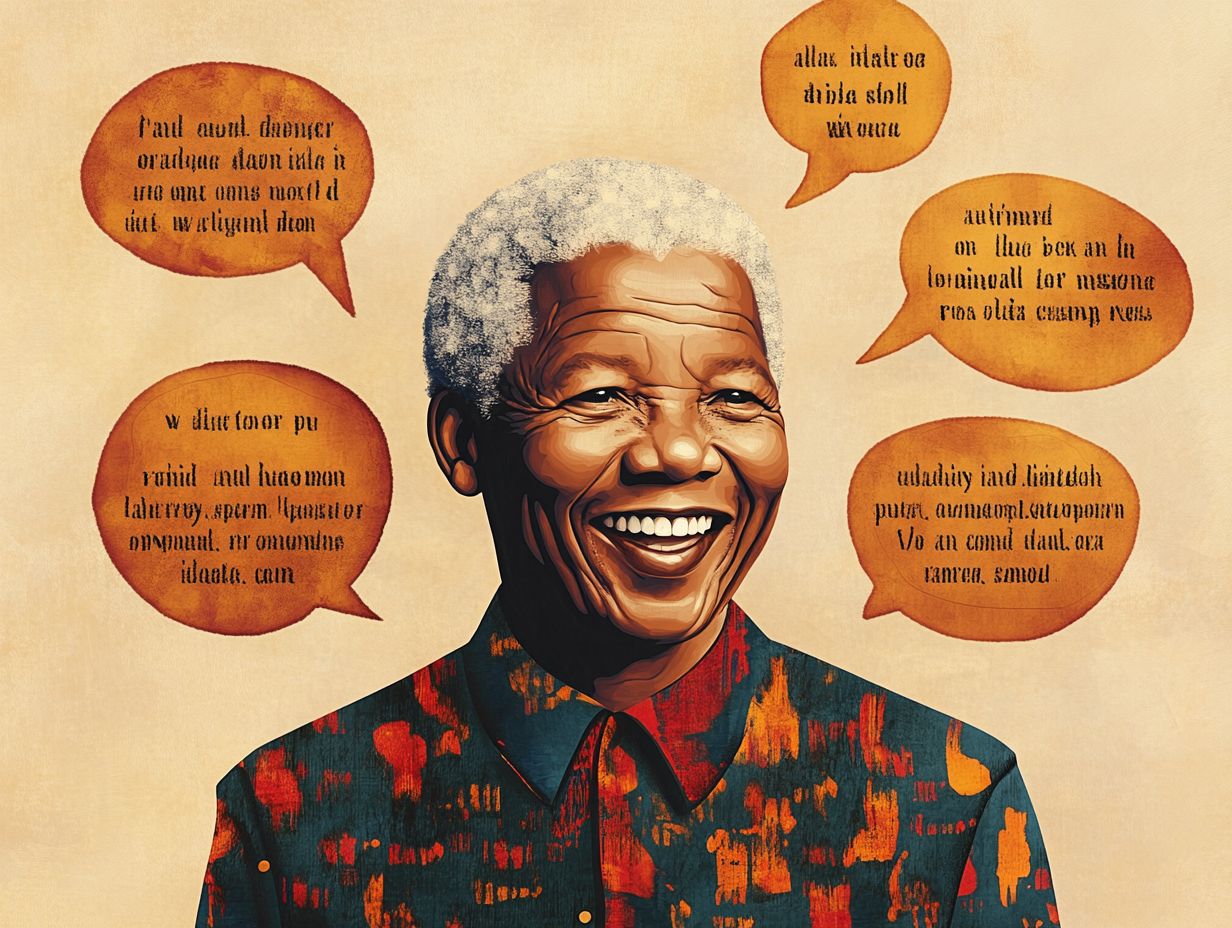
- Education is a powerful tool for change.
- Nothing is impossible if we have the determination to see it through.
- The true measure of greatness is not in never falling, but in always getting back up.
1. “Education is the most powerful weapon which you can use to change the world.”
Nelson Mandela profoundly stated, “Education is the most powerful weapon which you can use to change the world.” This powerful conviction highlights the critical role education plays in empowering individuals and communities around the globe, particularly in South Africa, where Mandela bravely fought against apartheid, a system of institutionalized racial segregation, and racial segregation to achieve majority rule and establish the first multiethnic government.
Mandela knew education could change lives. Throughout his life, he understood that education is a key part of human rights and freedom, enabling marginalized communities to break free from the chains of oppression. His own journey as a black nationalist revealed how limited access to education perpetuated cycles of poverty and injustice.
By advocating for quality education, Mandela believed you could cultivate critical thinking and resilience, fostering leaders who would challenge oppressive systems. He recognized that knowledge not only lights the path to personal empowerment but also fortifies collective efforts toward societal transformation.
In his vision, education transcended mere learning; it served as a catalyst for change, inspiring generations to pursue equality and justice.
2. “It always seems impossible until it’s done.”
Nelson Mandela’s belief that “It always seems impossible until it’s done” encapsulates his lifelong commitment to confronting the daunting challenges of apartheid and achieving racial harmony in South Africa.
Consider the harrowing experiences he endured on Robben Island, where he spent 27 years in isolation and harsh conditions. Mandela exemplified the courage required to pursue justice, even when the odds were overwhelmingly against him. His unyielding spirit during those years didn t just uplift his fellow prisoners; it ignited a nationwide yearning for change.
Mandela s release sparked a wave of hope that resonated deeply, showcasing how resilience and the human spirit can prevail against adversity.
This journey transcended personal freedom; it evolved into a powerful symbol of the collective struggle for equality, reminding you that profound change often sparks from the unwavering resolve of a single individual.
3. “The greatest glory in living lies not in never falling, but in rising every time we fall.”
Mandela famously asserted that “The greatest glory in living lies not in never falling, but in rising every time we fall,” capturing his belief that true strength resides in resilience and the relentless pursuit of justice, even amidst adversity in his fight against apartheid.
Throughout his remarkable journey, he faced countless trials, including a prolonged imprisonment and the ever-present threat of violence against his community. Each setback became a crucible, forging his unwavering determination.
Even during those 27 years behind bars, Mandela held onto hope, often engaging in profound discussions with fellow inmates about freedom and human rights. His ability to transform personal loss into a source of motivation stands as a testament to his indomitable spirit, illustrating that overcoming hardship is not just an act of defiance but a pathway to deeper understanding and unity.
This perspective serves as a powerful reminder that, regardless of the challenges you encounter, resilience can illuminate the path forward for others navigating their own struggles.
4. “I learned that courage was not the absence of fear, but the triumph over it.”
Nelson Mandela’s insight that “I learned that courage was not the absence of fear, but the triumph over it” provides a profound understanding of the human experience. As he faced the tough times of racial segregation and the system that enforced racial discrimination in South Africa, he became a beacon of hope. He advocated for peaceful transition and reconciliation.
Throughout his relentless activism during apartheid, he endured imprisonment and threats. Yet, he remained firm in his beliefs. Even in the monumental role of South Africa’s first black president, he felt the heavy burden of expectations.
Through his tireless efforts to unite a divided nation, Mandela showed how individuals can transform their fears into a powerful force for change.
His incredible journey reminds us that confronting challenges, rather than avoiding them, can lead to transformative moments in both personal and professional lives. This legacy inspires future generations to embrace their own courage and take decisive steps toward meaningful change.
5. “A good head and a good heart are always a formidable combination.”
Nelson Mandela’s belief that “A good head and a good heart are always a formidable combination” highlights the essential pairing of intellect and compassion in leadership, especially during his transformative role in South Africa’s history.
Throughout his journey, he embodied this synergy through strategic decisions and moments of deep understanding. His willingness to engage in dialogue with adversaries showcased an intelligence that transcended mere tactics; he recognized the importance of empathy in building trust and unity.
During crucial negotiations, Mandela prioritized reconciliation over retribution. He understood that true peace requires healing instead of division. This approach not only advanced human rights but also sparked a global movement for justice.
Mandela s philosophy emphasizes the vital balance between reason and compassion in leadership, encouraging future leaders like you to nurture both qualities for lasting change.
Why Is Nelson Mandela Considered an Inspirational Figure?
Nelson Mandela is an inspirational figure because of his unwavering commitment to fighting apartheid, his advocacy for human rights, and his remarkable ability to foster reconciliation in a nation torn apart by racial segregation. He has become a powerful symbol of courage and hope for freedom worldwide.
Winning the Nobel Peace Prize in 1993 marked just one of Mandela’s incredible achievements. His exceptional leadership showcased a steadfast belief in justice and equality for all. As South Africa’s first black president, he laid the groundwork for a more democratic society, promoting policies that encouraged social cohesion and inclusivity.
Mandela’s legacy is defined by his immense courage, inspiring individuals globally to rise against oppression. His lessons on forgiveness and unity motivate people today to pursue a more equitable world, ensuring that his profound impact continues long after his passing.
How Did Nelson Mandela’s Life and Struggles Impact His Views and Beliefs?
Nelson Mandela’s life and struggles, including his time on Robben Island, profoundly shaped his views on justice, equality, and the vital role of resilience in the fight against apartheid.
From his early years in Mvezo, where he first encountered the richness of tribal culture alongside the harsh reality of racial segregation, to actively participating in significant anti-apartheid movements, each phase of his life was crucial in shaping his ideals.
The personal sacrifices he made, especially the years spent imprisoned away from his family, deepened his understanding of human rights and reinforced his unwavering commitment to freedom not just for himself, but for all those living under oppression.
These formative experiences enriched his worldview, igniting a lifelong pursuit of a just society where equality could thrive.
What Are Some of Nelson Mandela’s Most Memorable Moments and Achievements?
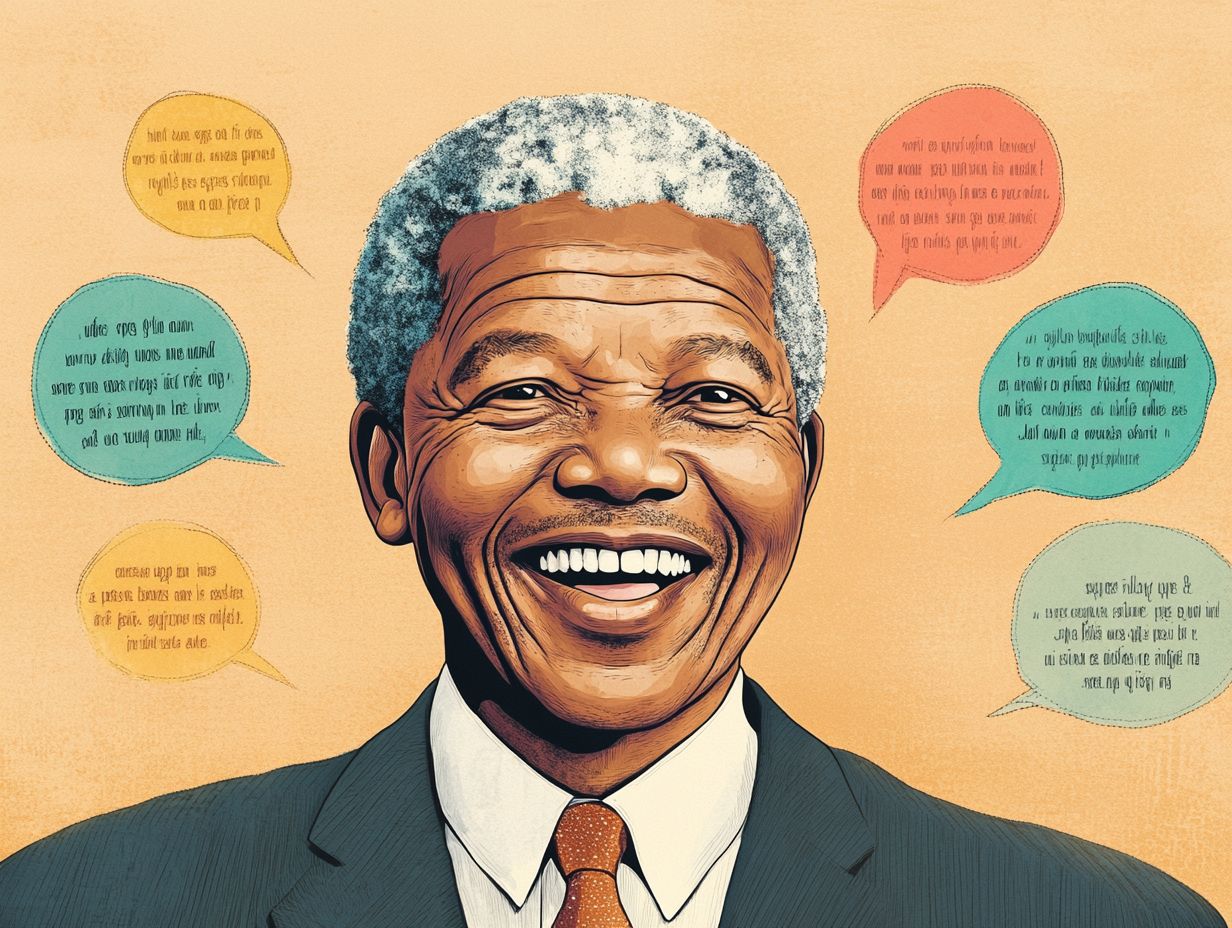
Some of Nelson Mandela’s most unforgettable moments and achievements include his release from Robben Island in 1990, his remarkable leadership during South Africa’s peaceful transition to democracy, and winning the Nobel Peace Prize for his tireless efforts in promoting racial harmony and justice.
These pivotal events not only illuminated his unwavering spirit but also cemented his status as a global icon in the fight against oppression.
Mandela’s election as South Africa’s first black president in 1994 represented a historic turning point, symbolizing the triumph of democracy over decades of racial injustice.
His extraordinary ability to unite a fractured nation inspired countless movements worldwide, reinforcing the powerful belief that working together can indeed bring about meaningful change.
Beyond borders, Mandela became a fierce advocate for human rights, playing an instrumental role in the global anti-apartheid movement, which fought against a system that separated people based on skin color and championed equality and dignity for all.
What Are Some Other Famous Quotes from Nelson Mandela?
Nelson Mandela’s powerful words resonate through the ages, inviting us to reflect on profound truths. When he states, “For to be free is not merely to cast off one’s chains, but to live in a way that respects and enhances the freedom of others,” he captures the essence of true freedom and human dignity. This insight not only summarizes his struggle against apartheid but also emphasizes that genuine freedom encompasses a collective responsibility toward society.
Consider his significant reminder, “It always seems impossible until it is done.” This quote serves as a beacon of resilience and determination, urging us to confront adversity head-on. Mandela faced seemingly insurmountable challenges, yet he maintained an unwavering belief in the potential for change.
When he asserts, “What counts in life is not the mere fact that we have lived. It is what difference we have made to the lives of others that will determine the significance of the life we lead,” he compels us to ponder the legacy we want to create for future generations. It reinforces the notion that a meaningful life is defined by our contributions to humanity.
These powerful quotes inspire us to embrace empathy and perseverance, encouraging us to become active participants in shaping the world around us.
How Can We Apply Nelson Mandela’s Words of Wisdom in Our Daily Lives?
Applying Nelson Mandela’s profound wisdom in our daily lives means embracing core values such as respect for others, the courage to stand up for justice, and the understanding that freedom is truly indivisible. These principles can ignite our passion for enacting meaningful change within our communities and beyond.
By reflecting on how these ideals influence our actions, we can make a difference today by advocating for human rights in our own spheres. Whether we’re volunteering at local shelters, participating in community forums, or raising awareness about social issues on social media, each effort counts.
Educating ourselves and those around us about the significance of equality and justice not only uplifts our community but also fosters a sense of unity. Building connections across various groups creates a supportive environment that encourages open dialogue and collaboration.
Every small step we take in alignment with Mandela’s teachings can significantly contribute to a more just and compassionate world.
What Can We Learn from Nelson Mandela’s Legacy?
Nelson Mandela’s legacy stands as a beacon of hope and a powerful reminder of resilience and courage in the pursuit of human rights. It imparts valuable lessons about the significance of compassion and justice in the search for freedom.
Your understanding of democracy and equality not only helped dismantle the oppressive regime in South Africa; it also ignited movements for justice across the globe. By promoting peace and reconciliation instead of revenge, he showed that true progress arises from understanding and inclusivity.
As you navigate today s societal challenges of inequality and discrimination, the relevance of his teachings is more apparent than ever. Each generation, including yours, carries the responsibility to honor his contributions by engaging in important discussions and working towards a world that embodies his ideals of unity and respect for all.
Frequently Asked Questions
This section highlights the significance of Nelson Mandela’s quotes and their impact on society.
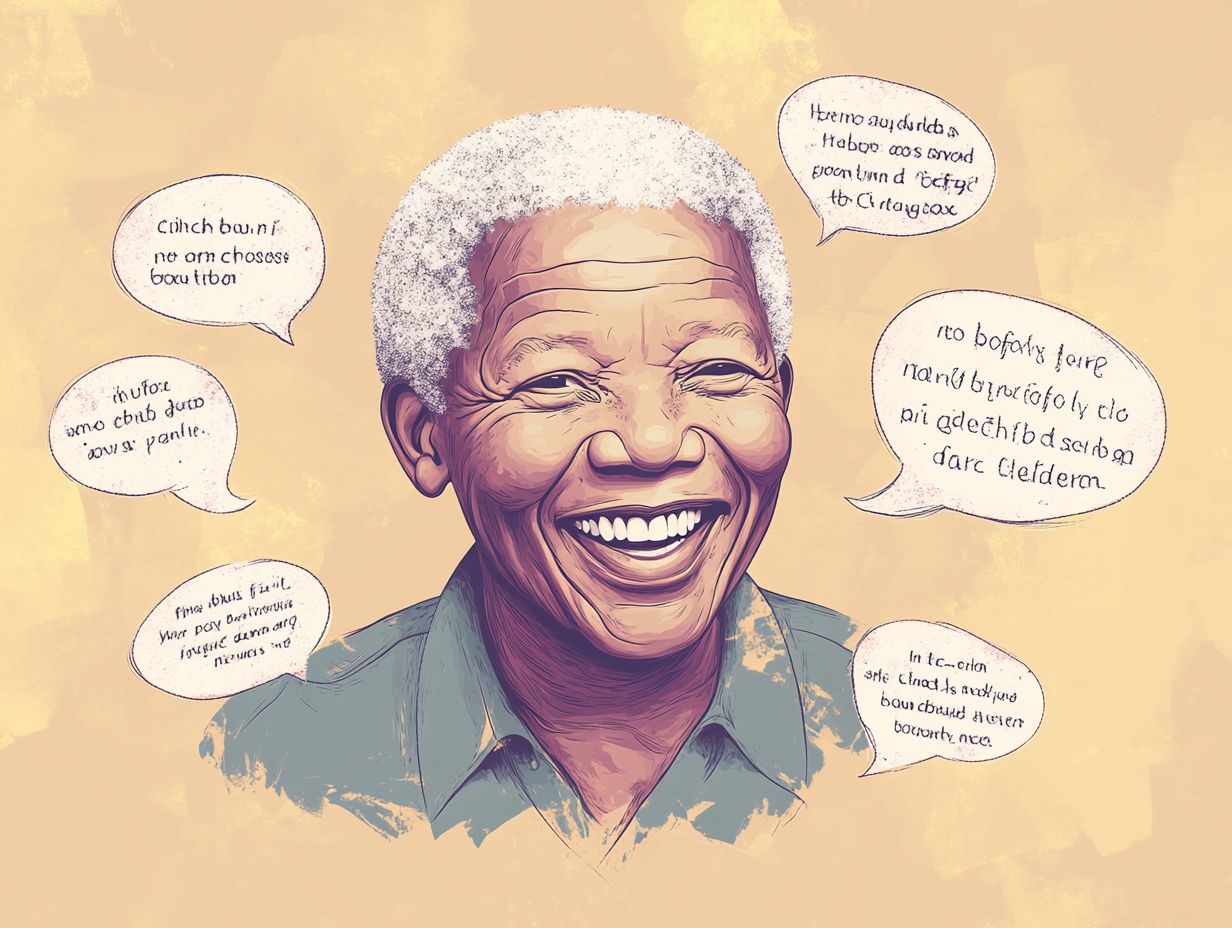
What are some of Nelson Mandela’s most inspirational quotes?
- 1. “It always seems impossible until it’s done.”
- 2. “Education is the most powerful weapon which you can use to change the world.”
- 3. “The greatest glory in living lies not in never falling, but in rising every time we fall.”
- 4. “A winner is a dreamer who never gives up.”
- 5. “It is what we make out of what we have, not what we are given, that separates one person from another.”
Why are these quotes considered inspirational?
Nelson Mandela’s quotes are considered inspirational because they come from a man who spent 27 years in prison fighting for justice and equality. Despite immense struggles, his words reflect resilience, courage, and a determination to make a positive impact on the world, much like the 5 inspiring quotes for daily motivation that encourage us to persevere.
What message do these quotes convey?
These quotes inspire hope, perseverance, and highlight the power of education and determination. They emphasize the importance of never giving up, even in the face of adversity.
How did Nelson Mandela become an inspirational figure?
Nelson Mandela became an inspirational figure through his unwavering dedication to fighting against apartheid and advocating for human rights. He demonstrated forgiveness and reconciliation, which led to him becoming the first black President of South Africa and a symbol of hope and unity.
What impact have these quotes had on society?
Nelson Mandela’s quotes have profoundly impacted society, inspiring individuals to combat injustice and work towards a better future. For those seeking motivation, exploring inspirational quotes to motivate your goals can enhance this journey. They have been used in speeches, books, and other media to spread his powerful messages to a wider audience.
How can these quotes be applied to our daily lives?
These quotes can remind us to never give up, to have faith in our abilities, and to use our education to positively impact the world. They also inspire us to practice forgiveness and work towards unity and equality in our communities.

